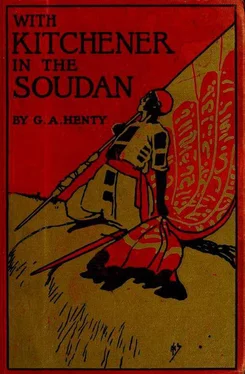"The hakims were immensely pleased, and both told me afterwards that both these medicines had done wonders. I told them that I thought there were some more bottles of these medicines in the chest, and that when they had finished those I had now given them I would look out for the others. I had, in fact, carried off a bottle both of quinine and zinc powder for my own use, and with the latter I greatly benefited several of the Emir's children and grand-children, all of whom were suffering from ophthalmia, or from sore eyes that would speedily have developed that disease if they had not been attended to. I had only performed one operation, which was essentially a minor one. Abu told me that his wife, of whom he was very fond, was suffering very great pain from a tooth—could I cure her?
"I said that without seeing the tooth I could not do anything, and he at once said:As it is for her good, Mudil, I will bring her into this room, and she shall unveil so that you can examine the tooth.' She was quite a girl, and for an Arab very good-looking. She and the Emir's wife were continually sending me out choice bits from their dinner, but I had not before seen her face. She was evidently a good deal confused at thus unveiling before a man, but Abu said:It is with my permission that you unveil, therefore there can be no harm in it. Besides, has not Mudil saved my life, and so become my brother?' He opened her mouth; the tooth was far back and broken, and the gum was greatly swelled.
"' It is very bad,' I said to Abu.It would hurt her terribly if I were to try and take it out, but if she will take the sleeping medicine I gave you I think that I could do it.'
"' Then she shall take it,' he said at once.It is not unpleasant; on the contrary, I dreamt a pleasant dream while you were taking off my arm. Please do it at once.'
"I at once fetched the chloroform, the inhaler, and a pair of forceps which looked well suited for the purpose, and probably were intended for it. I then told her to lie down on the angareb, which I placed close to the window.
"Now, Abu,' I said,directly she has gone off to sleep you must force her mouth open and put the handle of your dagger between her teeth. It will not hurt her at all. But I cannot get at the tooth unless the mouth is open, and we cannot open it until she is asleep, for the whole side of her face is swollen and the jaw almost stiff.'
" The chloroform took effect very quickly. Her husband had some difficulty in forcing the mouth open. When he had once done so, I took a firm hold of the tooth and wrenched it out.
" 'You can withdraw the dagger,' I said, 'and then lift her up and let her rinse her mouth well with the warm water I brought in. She will have little pain afterwards, though of course it will take some little time before the swelling goes down.'
" Then I went out and left them together. In a few minutes Abu came out.
"She has no pain,' he said.She could hardly believe, when she came round, that the tooth was out. It is a relief indeed. She has cried day and night for the past three days.'
"' Tell her that for the rest of the day she had better keep quiet and go to sleep if possible, which I have no doubt she will do, as she must be worn out with the pain she has been suffering.'
"' I begin to see, Mudil, that we are very ignorant. We can fight, but that is all we are good for. How much better it would be if, instead of regarding j-ou white men as enemies, we could get some of you to live here and teach us the wonderful things that you know!'
" 'Truly it would be better,' I said. 'It all depends upon yourselves. You have a great country. If you would but treat the poor people here well, and live in peace Avith other tribes, and send word down to Cairo that you desire above all things white hakims and others who would teach you, to come up and settle among you, assuredly they would come. There are thousands of white men and women working in India, and China, and other countries, content to do good, not looking for high pay, but content to live poorly. The difficulty is not in getting men willing to heal and to teach, but to persuade those whom they would benefit to allow them to do the work.'
" Abu shook his head.
" 'That is it,' he said. 'I would rather be able to do such things as you do, than be one of the most famous soldiers of the Mahdi; but I could never persuade others. They say that the Mahdi himself, although he is hostile to the Turks, and would conquer Egypt, would willingly befriend white men. But even he, powerful as he is, cannot go against the feelings of his emirs. Must we always be ignorant? Must we always be fighting ? I can see no way out of it. Can you, Mudil?'
"' I can see but one way,' I said,and that may seem to you impossible, because you know nothing of the strength of England. We have, as you know, easily beaten the Egyptian army, and we are now protectors of Egypt. If you invade that country, as the Mahdi has already threatened to do, it is Ave who will defend it; and if there is no other way of obtaining peace, we shall some day send an army to recover the Soudan. You will fight, and you will fight desperately, but you have no idea of the force that will advance against you. You know how Osman Digna's tribes on the Red Sea have been defeated, not by the superior courage of our men, but by our superior arms. And so it will be here. It may be many years before it comes about, but if you insist on war that is what will come. Then, when we have taken the Soudan, there will come peace, and the peasant will till his soil in safety; those who desire to be taught will be taught; great canals from the Nile will irrigate the soil, and the desert will become fruitful.'
"'You really think that would come of it?' Abu asked earnestly.
"I do, indeed, Abu. "We have conquered many brave peoples, far more numerous than yours; and those who were our bitterest enemies now see how they have benefited by it. Certainly England would not undertake the cost of such an expedition lightly, but if she is driven to it by your advance against Egypt she will assuredly do so. Your people—I mean the Baggaras and their allies—would suffer terribly; but the people whom you have conquered, whose villages you have burned, whose women you have carried off, would rejoice.'
"We would fight,' Abu said passionately.
"Certainly you would fight, and fight gallantly, but it would not avail you. Besides, Abu, you would be fighting for that ignorance you have just regretted, and against the teaching and progress you have wished for.'
"It is hard,' Abu said quietly.
"It is hard, but it has been the fate of all people who have resisted the advance of knowledge and civilization. Those who accept civilization as the people of India—of whom there are many more than in all Africa — have accepted it, are prosperous. In America and other great countries far beyond the seas the native Indians opposed it, but in vain; and now a great white race inhabit the land, and there is but a handful left of those who opposed them.'
"These things are hard to understand. If, as you say, your people come here some day to fight against us, I shall fight. If my people are defeated, and I am still alive, I shall say it is the will of Allah; let us make the best of it, and try to learn to be like those who have conquered us. I own to you that I am sick of bloodshed—not of blood shed in battle, but the blood of peaceful villagers; and though I grieve for my own people, I should feel that it was for the good of the land that the white men had become the masters.'
CHAPTER XIX
THE LAST PAGE
KHARTOUM, September 3rd, 1884. — It is a long time since I made my last entry. I could put no date to it then, and till yesterday could hardly even have named the month. I am back again among friends, but I can hardly say
Читать дальше












